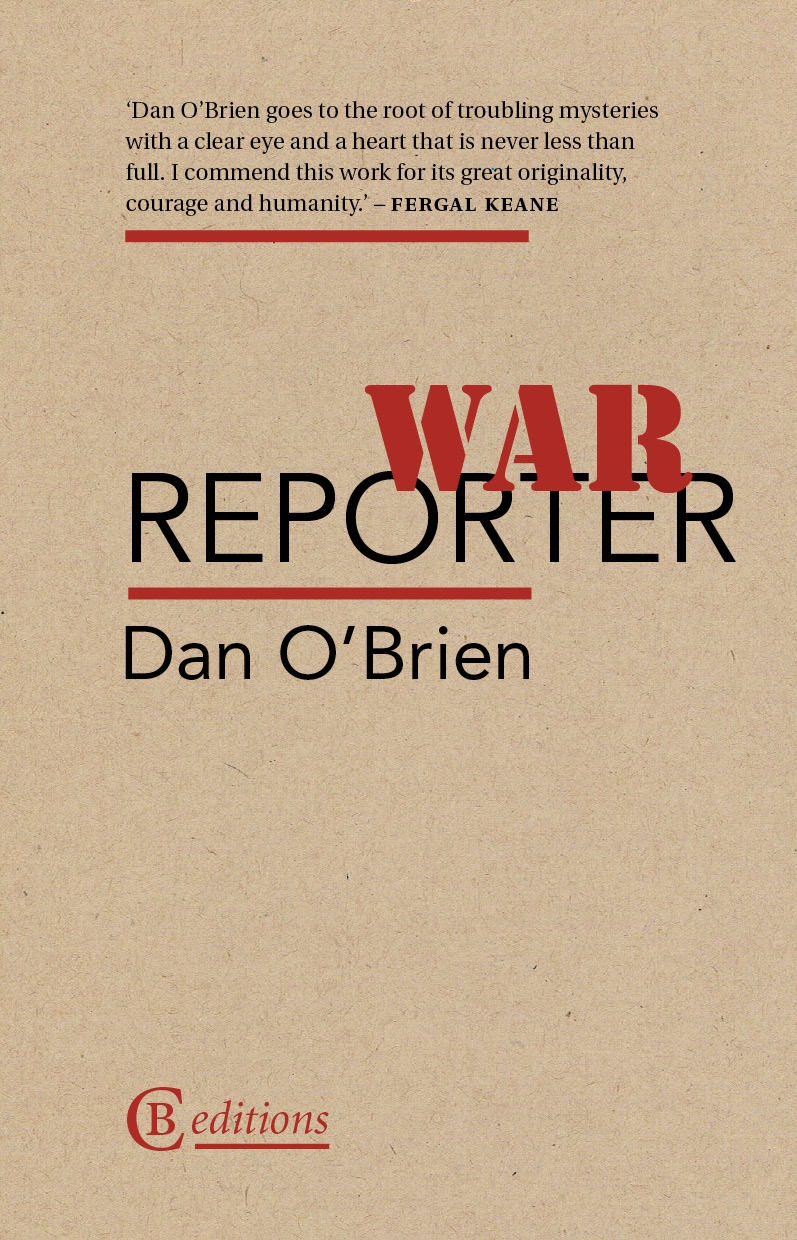War Reporter
Dan O'Brien
July 2013
Kelly M. Sylvester
 War Reporter tells a compelling story of war, conflict, and torment of the human spirit through a collection of poems based upon Dan O’Brien’s research, email exchanges, and interviews with photojournalist Paul Watson. Often the poems’ narrator is “The War Reporter Paul Watson on […]”. One of the most brilliant devices used in these poems is the heavy use of imagery. This comes as no surprise as these poems are being told from a photojournalist’s perspective. Very few poems from Watson’s narration read as his thoughts on a particular subject as much as they read like a series of snapshots through his photojournalistic lens to show his story. An example of this comes from “The War Reporter Paul Watson Considers the Peacekeepers”:
War Reporter tells a compelling story of war, conflict, and torment of the human spirit through a collection of poems based upon Dan O’Brien’s research, email exchanges, and interviews with photojournalist Paul Watson. Often the poems’ narrator is “The War Reporter Paul Watson on […]”. One of the most brilliant devices used in these poems is the heavy use of imagery. This comes as no surprise as these poems are being told from a photojournalist’s perspective. Very few poems from Watson’s narration read as his thoughts on a particular subject as much as they read like a series of snapshots through his photojournalistic lens to show his story. An example of this comes from “The War Reporter Paul Watson Considers the Peacekeepers”:
War Reporter tells a compelling story of war, conflict, and torment of the human spirit through a collection of poems based upon Dan O’Brien’s research, email exchanges, and interviews with photojournalist Paul Watson. Often the poems’ narrator is “The War Reporter Paul Watson on […]”. One of the most brilliant devices used in these poems is the heavy use of imagery. This comes as no surprise as these poems are being told from a photojournalist’s perspective. Very few poems from Watson’s narration read as his thoughts on a particular subject as much as they read like a series of snapshots through his photojournalistic lens to show his story. An example of this comes from “The War Reporter Paul Watson Considers the Peacekeepers”:
nothing. Nothing moves. I turn to the sound
of moaning. He’s maybe seven, lying
on his side in the street. While I’m standing
in a web of rippled gray mush. No blood
on him. The top of his head’s sliced open
like an eggshell. The skull’s completely white
and empty as if someone wiped it clean
with a cloth. A spray from a machine gun
blew his brains out. That’s what I’ve been standing
in. With his father lying beside him
facedown, an arm behind his back. He’s cut
almost in half. Bullets perforated
his belly. The moaning is a woman.
This excerpt also demonstrates the typical tone and sound present within most of the poems in War Reporter. My personal preference for poetry’s musical flow would seem ill-placed in conveying a war scene, where time moves abruptly in sudden bursts or momentarily halts into a freeze-frame or slow-motion sequence. These short, choppy sentences and line break structure create what one can only imagine as the feeling Watson experienced in those situations.
Another common convention throughout these poems is repetition. O’Brien masters the repetition of sound, words, phrases and the main source of Watson’s torment: “If you do this, I will own you forever.” Given the subject matter, the pleasure derived from reading some of these sounds feels wrong, such as “Black men in thongs and sarongs flung grenades” and:
with the usual boys of summer shooting
slapshots like rifles. Puck-scuffed Plexiglas
rebounding off Paul’s gaze. The Somalian
kid in the chopper crewman’s goggles grins
And yet, as poems on Jana Schneider, on love and on war reporting seem to indicate, some unknown human need is being met through these horrific experiences. Take these excerpts from “The War Reporter Paul Watson on War Reporting”:
In the beginning it was just because
I felt insecure. I’m sure you used to
feel that way too, Dan. I wanted people
to say I was brave, and heroic. Then
I grew to hate it but I still needed
that fix of adrenalin. Where I am
today? I don’t need it. But now I see
. . . . . . . . . . . . . . . . . . . . . . . . . . . . .
it like a labyrinth. If you get the truth
you get out. But you don’t, it just gets worse,
. . . . . . . . . . . . . . . . . . . . . . . . . . . . .
As long as I’m safe I don’t need to do
a thing. You see, this is why I don’t talk
to anyone. People ask me questions
they don’t want the answers to.
Do not miss this opportunity to view a world unlike any other, to view the dirty business of war through the eyes of the Canadian who’s been there and then placed into pages of poetry from an American poet. Even though the messages within many poems seem pretty clear and straightforward reporting, almost every poem grabs the imagination and forces deep contemplation. The search for answers and for truth knocks on every page—“A rule / that’s always served me well: When your knock comes, / don’t answer,”—and yet O’Brien, united with Watson, attempts to finally open the door that has been closed entirely too long.




